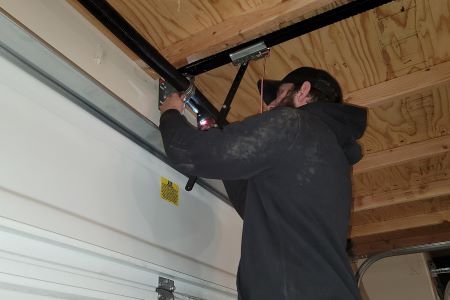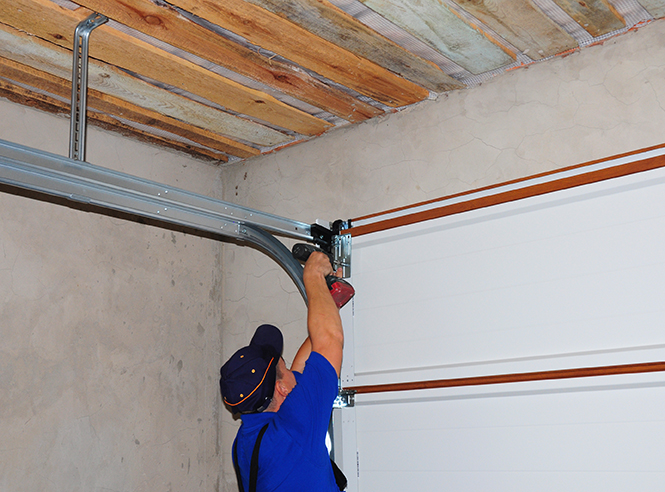Common Garage Door Issues and How to Fix Them
Garage doors are necessary for both security and comfort, yet they commonly present a selection of common problems that can annoy property owners. Issues such as excessive sound throughout procedure, doors that fall short to open or close, misaligned tracks, and malfunctioning remotes can occur without caution. While some problems may show up simple to resolve, others might call for a more nuanced understanding of garage door mechanics. Dealing with these troubles effectively not just improves capability however likewise prolongs the life of the door. One may question what steps are required to take on these obstacles effectively.
Noisy Garage Door Procedure
A noisy garage door operation can be a substantial resource of inconvenience for home owners, typically suggesting underlying mechanical problems. Such interruptions may originate from numerous reasons, consisting of damaged rollers, loosened equipment, or not enough lubrication. Recognizing the source of the sound is crucial for efficient resolution.
One usual reason of excessive sound is the existence of rustic or damaged rollers. With time, these elements can degrade, causing grinding or squealing audios as the door relocations. Routine inspection and replacement of these rollers can considerably reduce sound levels. In addition, loosened bolts or screws in the door mechanism can produce rattling sounds throughout procedure. Tightening up these fasteners makes certain a much more secure and quieter activity.
One more adding factor is insufficient lubrication of the door's moving parts. Applying a high-quality lubricant to the tracks, springs, and rollers can substantially decrease friction and noise. Property owners must execute this upkeep periodically to preserve ideal efficiency.
Last but not least, the garage door opener might also generate noise due to its age or mechanical problems. If the sound lingers regardless of resolving various other variables, seeking advice from a specialist for a thorough inspection and potential repair might be necessary.
Door Won't Open Up or Shut
Experiencing a garage door that won't open or close can be unbelievably irritating and often signals a breakdown within the system. A number of factors can add to this problem, and determining the origin cause is essential for efficient resolution.

Following, inspect the security sensing units situated at the base of the door. These sensors can come to be misaligned or obstructed by debris, protecting against the door from operating appropriately. Tidy the sensors with a soft fabric and guarantee they are straightened.
In addition, the garage door's interior elements should be reviewed. Problems such as a busted springtime, damaged rollers, or a damaged opener can impede movement. If any elements seem damaged, it might be recommended to consult an expert for repair services.
Misaligned Tracks
(Instant Help)Misaligned tracks can significantly interrupt the smooth operation of a garage door, bring about operational failings such as irregular activity or complete immobilization. This problem normally develops because of a selection of aspects, consisting of damage, unexpected impacts, or incorrect installation. When the tracks are misaligned, the rollers can stagnate openly, which not only stresses the motor but also poses security dangers.
If you discover any inconsistencies, it is essential to deal with the problem quickly. Carefully tap the track back right into its correct setting using a rubber mallet or a similar device, ensuring it is straight and degree.
Routine maintenance, consisting of cleaning the tracks and guaranteeing rollers are in good problem, can prevent future misalignments. By attending to misaligned tracks promptly, you can recover the performance of your garage door and boost its long life.
Broken Springs
Amongst the numerous parts of a garage door system, broken springs are among one of the most typical concerns that can dramatically hamper its functionality. Garage door springs are important for stabilizing the weight of the door, permitting smooth opening and closing. When a spring breaks, it can result in a door that is difficult to operate or, in many cases, completely unusable.
There are 2 major kinds of springtimes: torsion springs, which are installed over the door, and extension springs, found on either side. Indications of a damaged spring include a door that won't open up, a noticeable void in the springtime, or a loud noise throughout operation. Attempting to operate a garage door with a damaged springtime can cause further damage to the door or the opener.
Fixing busted springs is not a do it yourself task; it needs specialized devices and expertise due to the high stress entailed. It is advisable to seek advice from an expert technician who can securely change the springtimes and make sure the door is correctly stabilized. Routine maintenance and inspections can help stop spring failures and prolong the life-span of the garage door system.
Remote Issues

If the remote still fails to run, check the garage door opener to make sure that its sensing units are tidy and unblocked. Dust, particles, or misalignment might impede the signal transmission between the remote and the opener.
Interference from official source other digital devices can also restrain remote capability. Make sure that neighboring devices, such as cordless routers or cordless phones, are not creating disruptions. garage door service. If interference is suspected, attempt moving these devices additionally far from the garage door opener
In many cases, the remote may require to be reprogrammed. Seek advice from the manufacturer's guidelines to reset the remote and synchronize it with the garage door opener. If all else fails and the remote remains to malfunction, consider getting in touch with a specialist specialist for an extensive evaluation and prospective substitute of the remote or opener.
Final Thought
(Highly Skilled)In recap, typical garage door problems can dramatically impact performance and safety. Addressing noisy operation includes lubrication and tightening up equipment, while issues with opening or closing call for evaluation of power sources and sensing units. Misaligned tracks can be corrected through modification, although damaged springs require expert treatment. Remote breakdowns typically occur from weak batteries or interference, which can be dealt with via substitute or reprogramming. Aggressive upkeep and prompt repairs can make certain ideal performance and durability of garage doors.